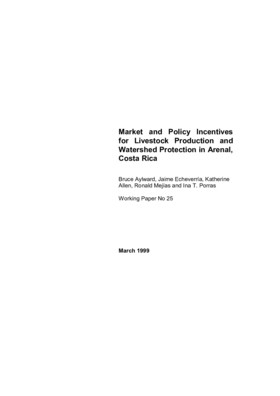Market and Policy Incentives for Livestock Production and Watershed Protection in Arenal, Costa Rica

Conventional wisdom amongst environmentalists holds that the cutting of tropical forest for livestock production is not only bad business but also bad for the environment. In particular, it is thought that conversion to pasture leads to rising sedimentation of waterways and reservoirs, an increase in flooding and loss of dry season water supply. In the case of Lake Arenal, Costa Rica this conventional wisdom is stood on its head in an evaluation of the market and policy incentives guiding land use in the Río Chiquito watershed of the Arenal region of Costa Rica. The study suggests that ranching, dairy and associated downstream hydrological effects represent important values to the Costa Rican economy, values that significantly outweigh expected returns from options for reforestation or forest regeneration. Further, there appear to be no large market or policy incentives subsidizing livestock production or providing incentives for rapid deterioration of soil productivity. Thus non-hydrological externalities associated with changing land use from forests to livestock production, such as carbon fixation, biodiversity, ecotourism and existence values, are likely to be of minimal importance in Río Chiquito. Therefore the analysis suggests that there is little reason to encourage large-scale reforestation of the watershed or to purchase land for protection. Instead efforts should focus on how to maximise the complementary returns from livestock and water production.
Cite this publication
Available at https://www.iied.org/8112iied